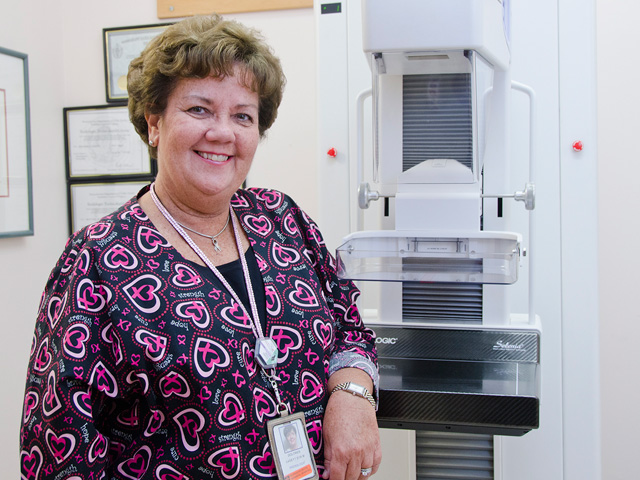Dolores' Story: How Screening Led to Early Detection
Schedule a Mammogram
You can call our Central Scheduling Office to schedule a mammogram in Boston, Waltham, Revere or Danvers without a doctor's order.
Dolores Dunne LeGeyt is a former Mass General breast imaging technologist who never missed a mammogram. She is also a breast cancer survivor.
Most women don't look forward to having a mammogram, but many report that a good breast imaging technologist can make a difference.

Meet Dolores Dunne LeGeyt, a former breast imaging technologist at the MGH Revere HealthCare Center. When she welcomed her patients, she often heard, “Why do I have to do this?” Her own story provides a compelling answer.
In 2010, Dolores had a routine mammogram performed by a co-worker. "When I looked at my images, I thought I saw calcifications," she says. After additional imaging, she was diagnosed with breast cancer. "I never really got myself crazed because I considered myself lucky that mammography found it early," she adds.
Under the care of Barbara Smith, MD, a surgical oncologist and director of the breast program at the Mass General Cancer Center, Dolores had a lumpectomy followed by six weeks of radiation therapy. Within a few months of her diagnosis, she was back at work and seeing patients.
Dolores describes her breast cancer diagnosis as a leveler. "I'm on both sides of it," she says. "I [was a breast imaging technologist], but I've also been through it so I know how people feel." She recalls that many patients acknowledged being nervous about the exam.
Dolores Dunne LeGeytA mammogram can be more uncomfortable for some women than others. To help achieve a good study, my job is to keep the patient relaxed, explain the procedure and work with a patient's concerns.
Former Mass General breast imaging technologist
"Everyone has a different experience," she says. " A mammogram can be more uncomfortable for some women than others. To help achieve a good study, [I tried] to keep the patient relaxed, explain the procedure and work with a patient's concerns."
She also met patients who told her that they were planing to skip their next mammogram. "That's when I tell them what happened to me," she says. "And that I've never missed a mammogram."
Without regular mammograms, Dolores believes that her cancer could have developed into a more invasive type. “Early detection saves lives," she says. "I know it saved mine."
Breast Tomosynthesis
Pioneered at Mass General, breast tomosynthesis is our standard of care for screening mammography.
